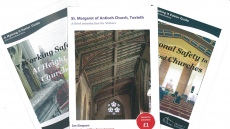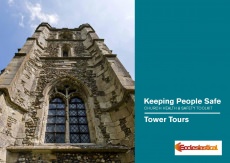Here is some advice on making the most of your building as a place of hospitality and historic interest
Why bother?
Research by the Church Visitor & Tourism Association (CVTA) shows that 40 million visits are made to churches each year and that on average a parish church can expect between 700 and 4,000 visits a year.
These are figures most churches can only dream of in terms of their congregations, and represent a massive opportunity for mission. Most church visitors are happy to make a donation to church funds if approached in the correct manner.
But what about insurance?
 Surely having people wandering around the church puts it at risk of damage, vandalism or theft?
Surely having people wandering around the church puts it at risk of damage, vandalism or theft?
The official position from Ecclesiastical Insurance which insures most Anglican churches is that churches should be open as often as possible: if they are obviously open, cared for, and – where possible – attended, this actually deters crime.
There are some obvious precautions to observe, such as locking away valuables and cash and preventing access to dangerous areas such as boiler rooms and vertical ladders, and the Ecclesiastical Insurance website gives full details of these.
Now is the time to start looking at how well your church welcomes visitors and tourists.
Ten Top Tips to get you started!
- Decide on opening times and stick to them: We all accept that occasionally there will be a funeral or other event which prevents the church from being open to the public, but generally sticking to set times allows the church to plan for volunteer attendants to be available and visitors to plan their visit.
- Publicise the fact the church is open: There are so many low-cost and no-cost ways of doing this nowadays that there is no excuse for not doing so! Place a sign outside the Church, advertise it on Facebook, Twitter and/or the church website. The more people know your church is open, the more people will come and visit it.
- Offer visitors a warm and genuine welcome: Hospitality and welcome are at the heart of our faith, and opening up our churches gives us the opportunity to practice them. It is obviously best to have someone there to greet visitors, talk to them and offer to show them around, but if this is not possible, provide then some attractive welcome signs with contact details and basic information about the church.
- Give visitors accurate and up-to-date information: It is better to offer no information at all than to leave out-of-date information on display. Nobody wants to come to a church and read a poster advertising last year’s Christingle service or a flower festival which finished a week ago. It is even worse if service times, contact details, etc. are out of date.
- Make votive candles available: Many people who visit churches aren’t interested in joining or attending regular services, but they are happy to sit, pray and light a candle - perhaps in memory of a loved one or as a prayer for someone who is ill. They are generally happy to make a donation in return for the candle. One church paid for new toilet facilities entirely out of the profits from its votive candle stand!
- Write – and sell – a quality guidebook: Guidebooks can be lucrative as a lot of people collect them as souvenirs of their visit. Make it as attractive and as accurate as possible. I have produced guidelines on writing and selling church guidebooks - contact me for details.
- Make Gift Aid envelopes available: Gift Aid increases the value of any donations received by 25% at no extra cost to the donors provided they are UK taxpayers.
- Leave a guestbook out and encourage visitors to sign it: The guestbook is a very useful source of information which builds up over time: how many visitors came, where they came from, what they liked and - and didn’t like - about it. It is also a means of communication as visitors can leave prayer requests, personal memories of the church, and other messages.
- Consider partnerships with other local churches, businesses or attractions: If there are other churches nearby, why not consider co-ordinating visiting times and forming a 'tourist trail'? A local cafe or tea-room might offer church visitors a small discount in return for some publicity on the church noticeboard or in the church magazine/guidebook? The possibilities are endless!
- Join the Church Visitor & Tourism Association (CVTA): The CVTA is the UK’s premier association for those involved in church tourism and offers a website with loads of useful resources, a regular email newsletter and an excellent annual symposium. You will get lots of useful ideas and support.
One of my projects is to increase the number of churches in the Diocese of Liverpool which is open to visitors and tourists, to support those which already are and which seek to improve the experience they offer to their visitors or to attract more of them.